Abstract
A thiosulfate reductase from Desulfotomaculum nigrificans has been partially purified by ammonium sulfate fractionation, diethylaminoethylcellulose chromatography, and sucrose density gradient centrifugation. With inner-and outer-labeled 35S-thiosulfate, the enzyme reduced only the outer sulfur atom to hydrogen sulfide. The enzyme was inhibited by sulfite and also by several sulfhydryl inhibitors. The Km value for this enzyme was calculated to be 1.3 × 10−1m. Other inorganic sulfur compounds, such as sulfate, sulfite, tetrathionate, and dithionate, were not reduced by this enzyme.
Full text
PDF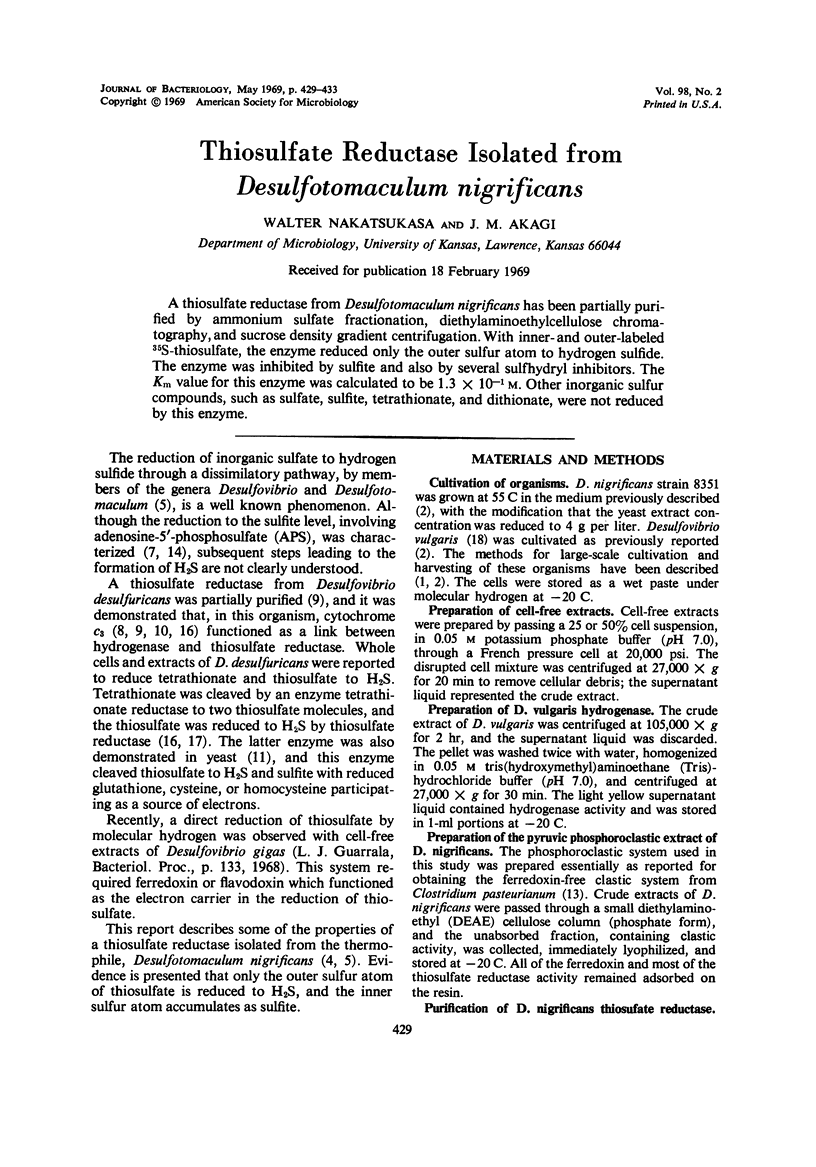
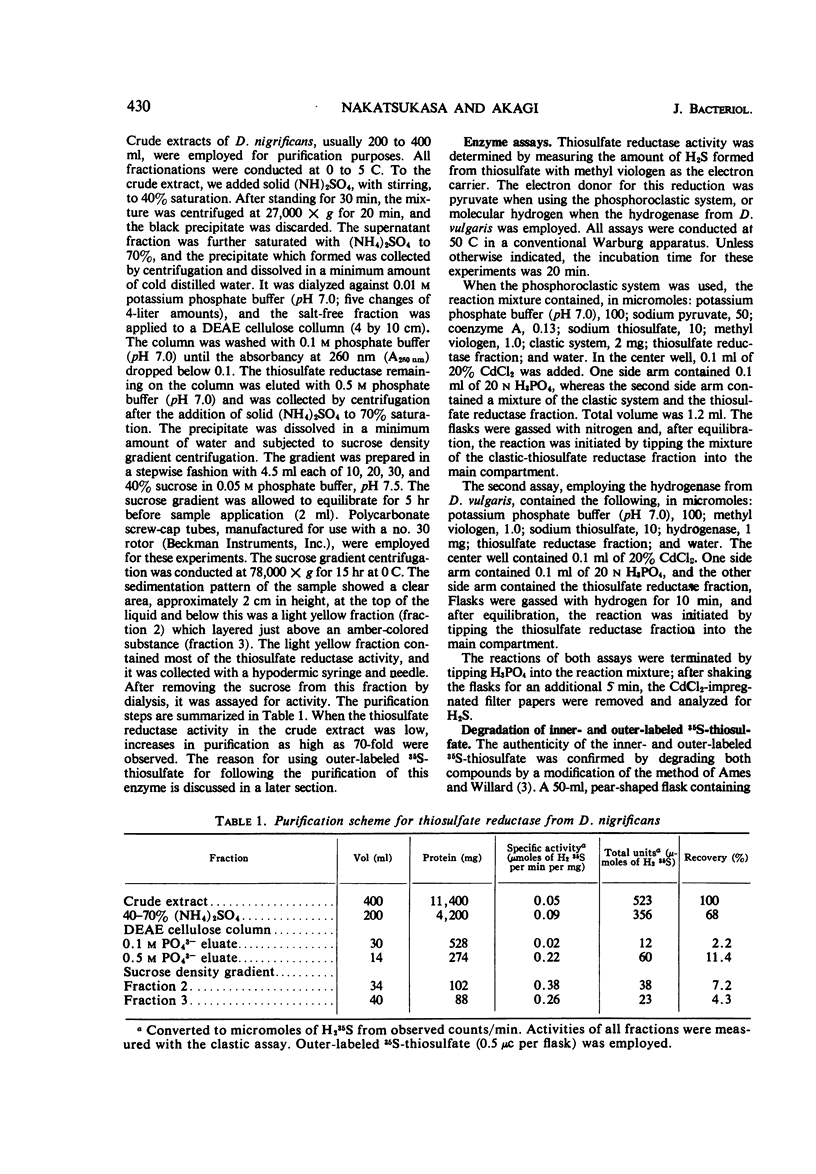
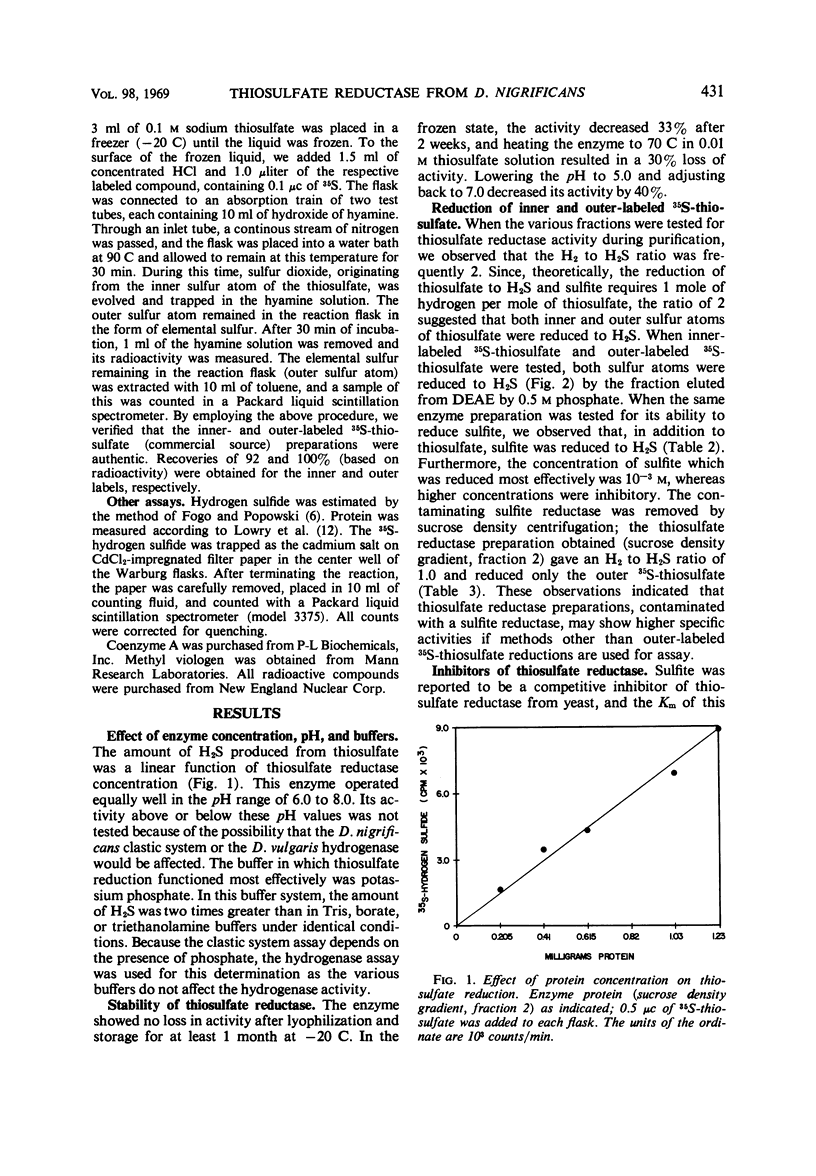
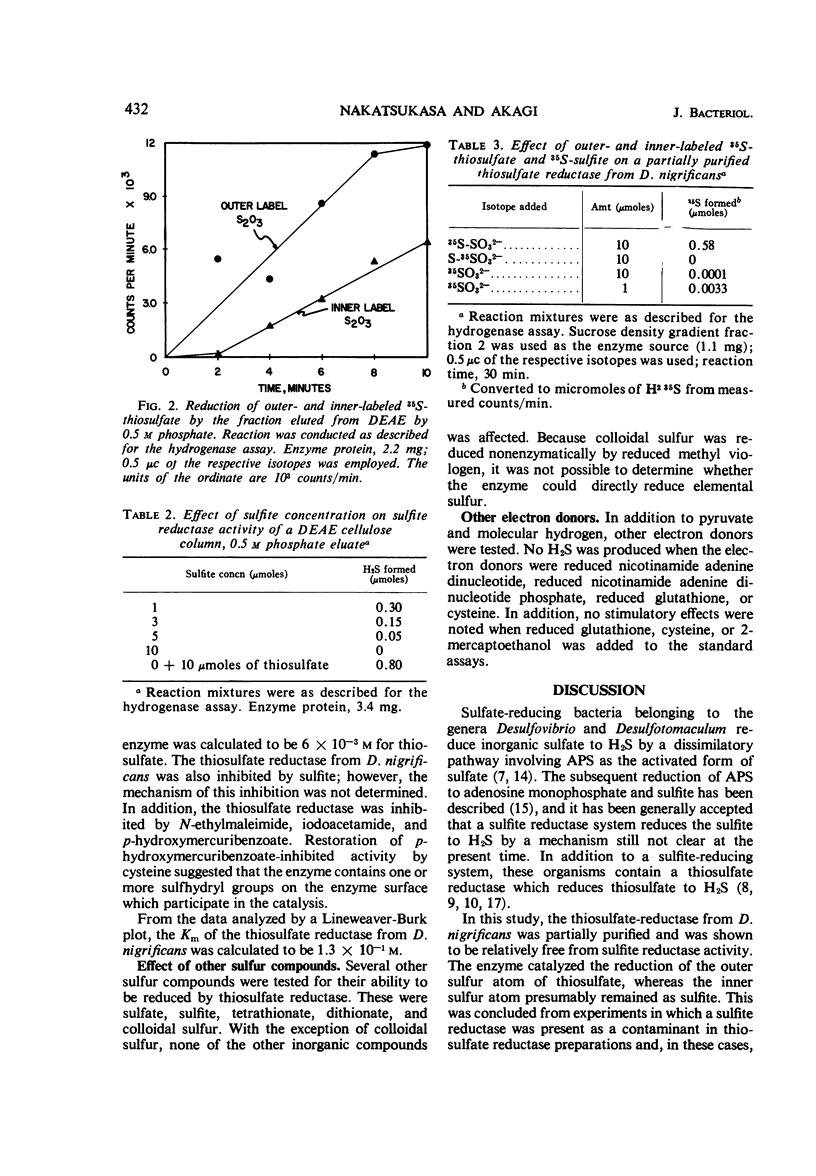
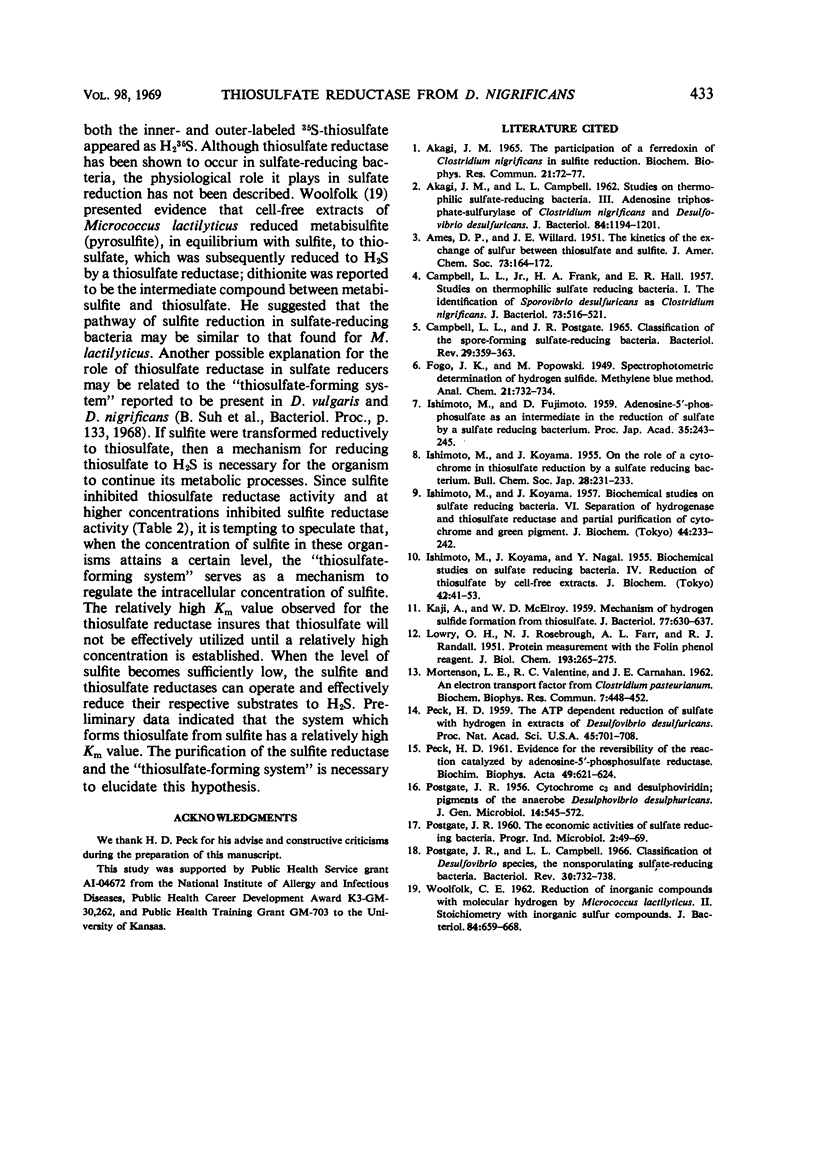
Selected References
These references are in PubMed. This may not be the complete list of references from this article.
- Akagi J. M., Campbell L. L. STUDIES ON THERMOPHILIC SULFATE-REDUCING BACTERIA III. : Adenosine Triphosphate-sulfurylase of Clostridium nigrificans and Desulfovibrio desulfuricans. J Bacteriol. 1962 Dec;84(6):1194–1201. doi: 10.1128/jb.84.6.1194-1201.1962. [DOI] [PMC free article] [PubMed] [Google Scholar]
- Akagi J. M. The participation of a ferredoxin of Clostridium nigrificans in sulfite reduction. Biochem Biophys Res Commun. 1965 Oct 8;21(1):72–77. doi: 10.1016/0006-291x(65)90428-6. [DOI] [PubMed] [Google Scholar]
- CAMPBELL L. L., Jr, FRANK H. A., HALL E. R. Studies on thermophilic sulfate reducing bacteria. I. Identification of Sporovibrio desulfuricans as Clostridium nigrificans. J Bacteriol. 1957 Apr;73(4):516–521. doi: 10.1128/jb.73.4.516-521.1957. [DOI] [PMC free article] [PubMed] [Google Scholar]
- Campbell L. L., Postgate J. R. Classification of the spore-forming sulfate-reducing bacteria. Bacteriol Rev. 1965 Sep;29(3):359–363. doi: 10.1128/br.29.3.359-363.1965. [DOI] [PMC free article] [PubMed] [Google Scholar]
- KAJI A., McELROY W. D. Mechanism of hydrogen sulfide formation from thiosulfate. J Bacteriol. 1959 May;77(5):630–637. doi: 10.1128/jb.77.5.630-637.1959. [DOI] [PMC free article] [PubMed] [Google Scholar]
- LOWRY O. H., ROSEBROUGH N. J., FARR A. L., RANDALL R. J. Protein measurement with the Folin phenol reagent. J Biol Chem. 1951 Nov;193(1):265–275. [PubMed] [Google Scholar]
- MORTENSON L. E., VALENTINE R. C., CARNAHAN J. E. An electron transport factor from Clostridium pasteurianum. Biochem Biophys Res Commun. 1962 Jun 4;7:448–452. doi: 10.1016/0006-291x(62)90333-9. [DOI] [PubMed] [Google Scholar]
- PECK H. D., Jr Evidence for the reversibility of the reaction catalyzed by adenosine 5'-phosphosulfate reductase. Biochim Biophys Acta. 1961 May 27;49:621–624. doi: 10.1016/0006-3002(61)90273-6. [DOI] [PubMed] [Google Scholar]
- POSTGATE J. R. Cytochrome c3 and desulphoviridin; pigments of the anaerobe Desulphovibrio desulphuricans. J Gen Microbiol. 1956 Jul;14(3):545–572. doi: 10.1099/00221287-14-3-545. [DOI] [PubMed] [Google Scholar]
- POSTGATE J. The economic activities of sulphate-reducing bacteria. Prog Ind Microbiol. 1960;2:47–69. [PubMed] [Google Scholar]
- Peck H. D. THE ATP-DEPENDENT REDUCTION OF SULFATE WITH HYDROGEN IN EXTRACTS OF DESULFOVIBRIO DESULFURICANS. Proc Natl Acad Sci U S A. 1959 May;45(5):701–708. doi: 10.1073/pnas.45.5.701. [DOI] [PMC free article] [PubMed] [Google Scholar]
- Postgate J. R., Campbell L. L. Classification of Desulfovibrio species, the nonsporulating sulfate-reducing bacteria. Bacteriol Rev. 1966 Dec;30(4):732–738. doi: 10.1128/br.30.4.732-738.1966. [DOI] [PMC free article] [PubMed] [Google Scholar]
- WOOLFOLK C. A. Reduction of inorganic compounds with molecular hydrogen by Micrococcus lactilyticus. II. Stoichiometry with inorganic sulfur compounds. J Bacteriol. 1962 Oct;84:659–668. doi: 10.1128/jb.84.4.659-668.1962. [DOI] [PMC free article] [PubMed] [Google Scholar]



